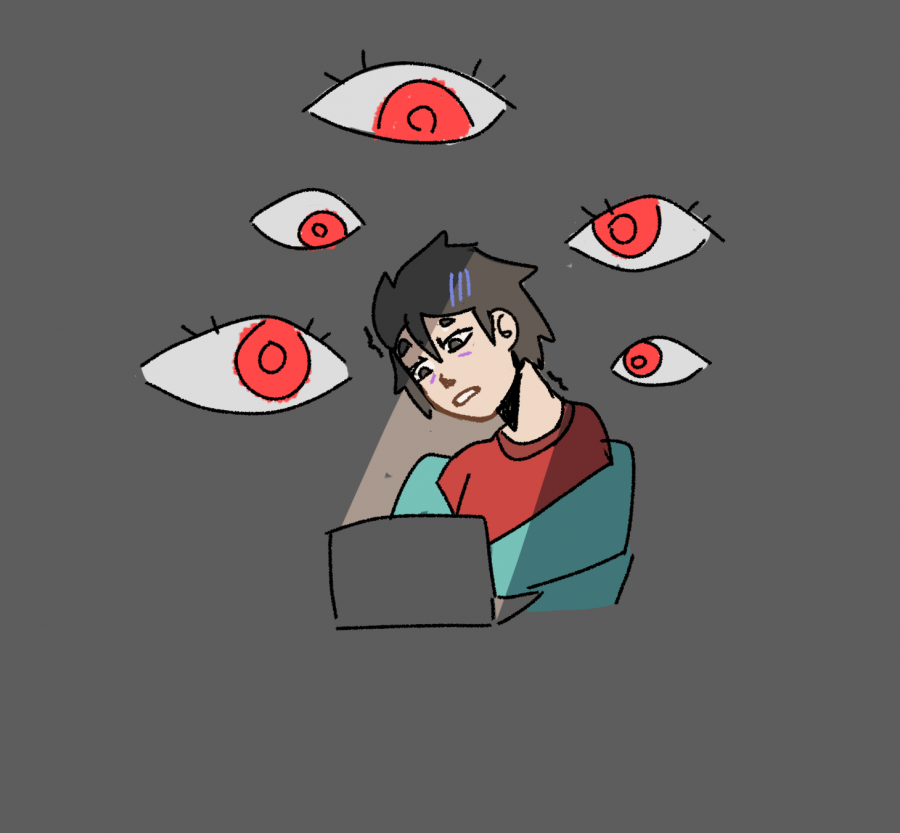Exposing students during the most stressful times, Zoom cameras should not be required
Breakout rooms have been the most challenging aspect of online learning to overcome.
December 30, 2020
This year, virtual school has forced Richard Montgomery students into a confusing and stressful learning environment. From the endless barrage of 11:59 p.m. deadlines to the absence of social interactions, online school is exhausting enough without the constant insistence from teachers to turn on cameras during Zoom classes.
Richard Montgomery needs to prioritize student mental health and overall wellbeing by not requiring zoom cameras–especially since it is such a fatiguing task for many. It brings emotional discomfort and invades the security of students. If cameras are not essential to a course, then they are more problematic than they are beneficial.
Enforcing a camera mandate could worsen the quality of a student’s learning experience. Many are uncomfortable with displaying their surroundings to all their classmates, while others suffer from other forms of anxiety and self-consciousness. By forcing a student to keep their camera on all day, they will be distracted from their lessons with these concerns. High school students could get discouraged and unmotivated to complete their work because of this heightened stress.
Aside from the camera-sharing aspect, virtual school, in general, has been a difficult transition for high school students. Physical education and health teacher Barbara Contino said, “I have had kids say online school is interfering with their motivation to do things… they are telling me they are depressed and anxious.” Reminders to turn cameras on, among other virtual elements, might seem harmless to the teachers, but they can create distress for many students and make online school an unnecessarily intimidating environment.
Spending up to 12 hours a day sitting behind a screen for school-related activities, many are experiencing a new phenomenon called “Zoom fatigue”. For hours a day, students are forced to maintain online etiquette and focus their attention on the unnatural pixelated faces of their teachers and classmates. Piling on constant video engagement can drain and disengage high schoolers. Sometimes, a black screen of names can provide a much-needed release from having to keep up appearances. To keep students’ drive for learning intact, their mental health should be considered first.
Montgomery County Public Schools administration failed to understand the impact of online school on high school student’s already fragile mental health. Virtual school has already exacerbated existing mental health conditions in many students and developed new ones in others. For something that appears trivial, many students are consumed by the petrifying thought of having everyone in class looking at them. This results in the possibility of them falling behind in their classes. School administration and staff are eager to alleviate burdens on students, and the elimination of camera policies offers a simple yet effective method of doing so.
High schoolers are already bombarded with daily obligations, and turning on cameras has begun to feel like another dismaying chore. Junior Natasha Nguyen said, “with so many classes and assignments, some days I just want to keep my camera off because it can be overwhelming.” If the requirement of Zoom cameras does not incur any significant benefit, then it should not be mandated.
By requiring Zoom cameras, students are also pressured to reveal deeply personal aspects such as their living conditions or even family issues. During a worldwide pandemic in which numerous families are struggling due to reduced income or domestic troubles, many students may feel too uneasy with exposing their personal environments after extreme changes to their lives. Sophomore Paulyn Baringanire said, “I feel like a lot of people feel uncomfortable and it shouldn’t be forced on us.” Teachers need to empathize with students and respect personal privacy.
High schools are often rampant with bullying and camera requirement policies warrant unwanted attention for many students. Ill-intentioned students could abuse the misfortunes of others and send damaging messages to struggling classmates. This only compounds the already strenuous effects of virtual schooling. The simplest solution to deter such bullying is to ensure a lack of camera requirements.
The absence of cameras allows students to feel safe and respected in a virtual environment. By establishing trust with their teachers, high schoolers will feel more at ease and potentially participate more in class. It is important to respect student privacy and mental health as failing to do so could be detrimental to their quality of education. Once RM focuses on the comfort of students, the difficulties of a virtual school year are more likely to subside. If teachers could tolerate the occasional black screen, then online school would be a much less dreadful experience for students.



